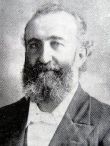French-born composer, music director, musician. Born in Boulogne-su-Mer, near Calais, Leon Francis Victor Caron was one of the leading conductors and theatre composers working in Australia during the last decades of the nineteenth century. It was as music director for J. C. Williamson's Royal Comic Opera Company, however, that he is most associated. A talented violinist, Caron studied at the Paris Conservatoire in the late 1860s under Guilmant, the noted organist. When the Franco-Prussian War broke out, Caron sought refuge in London and subsequently found himself engaged as a violinist for the Jules Riviére Orchestra at the Alhambra Theatre in London. Travelling to America in 1872, he played violin with the French Opera in New Orleans, and afterwards joined the Theodore Thomas Orchestra. He toured the United States until the orchestra disbanded after its engagement at the 1876 Philadelphia Exhibition. Caron then travelled to Australia, arriving in the country in December that same year. Settling in Melbourne, his first musical engagement is believed to have been as a solo violinist at the Melbourne Opera House. This led to him being offered the position of violinist and part-time conductor for William Lyster's Opera Company. By 1879, he was the company's regular conductor. 1879 also saw Caron perform a key role with the orchestra for Garnet Walch's pantomime Babes in the Woods, staged at Melbourne's Theatre Royal.
In 1880, Caron won a competition held during the Melbourne International Exhibition for his cantata Victoria. It was subsequently used to open the exhibition, and involved a 1,000 stong chorus and orchestra of 125 musicians. During the early 1880s, he conducted and arranged a number of opera productions for the Montague-Turner Opera Company (which came to Australia initially under the auspices of Lyster) and Farley's English Opera Company (Sydney, 1886). Along with several other prominent Sydney-based musicians, he also founded the Orpheus Club (1887-91), which held promenade concerts and private soirées. On 14 March 1888, Caron premiered another of his works, the National Cantata, as part of the centenary celebrations (the cantata was revived in Melbourne in 1972). The following year, he joined J. C. Williamson's Ltd as Music Director for the Royal Comic Opera Company and went on to conduct many music theatre productions for the firm, including the numerous Gilbert and Sullivan operettas and other popular works such as The Old Guard and The Merry Monarch. He also conducted, in November 1894, the first professional production of Sir William Robinson and Francis Hart's operetta Predatoros, starring Nellie Stewart. In later years, Caron conducted such prominent productions as Basil Hood's The French Maid (1898), Alfred Cellier's Dorothy (1898), Sidney Jones's The Geisha (1899), Edmond Audren and Arthur Sturgess's La Poupee (1899), and Owen Hall's Florodora (1900). He also directed the incidental music for many of Williamson's straight theatre works, including, for example, The Silver King (1898) and The Manxman (1898).
A good deal of Leon Caron's work was published in Australia. An appraisal of the criticism directed at his compositions by his peers indicates that he was regarded as a composer of real (if minor) talent and a polished craftsman. In this regard, it might be argued that his most successful compositions were for the pantomimes staged by J. C. Williamson, notably Djin Djin, the Japanese Bogie Man (1895), Matsa, Queen of Fire (1896), The 40 Thieves (1898), Little Red Riding Hood (1899, with F.W. Weierter), Dick Whittington and His Cat (1902), and a collaboration with composer Frederick W. Weierter on the score for Williamson's Federation pantomime, Australis, or, The City of Zero (1900). Caron's creative output also included three string quartets, a choral symphony (Symphonie Poéme I'Idéal), a violin concerto, and several orchestral works, including Souvenir Patriotique; Or, An Episode of '93 (which evokes the mood of a mob of revolutionaries in Marseilles) and Birds of the Forest, an overture described in the Sydney Morning Herald as a 'vivacious pastoral' (29 April 1899, p.4). An opera, Mata-Mati, was completed but has never been performed. Other compositions of note include 'Invocation to Love' written especially for Nellie Stewart in her lead role in the operetta Mam'zelle Nitouche, staged in 1895 by Williamson and Musgrove's Royal Comic Opera Company (Sydney's Lyceum Theatre, 8-14 June), and an accompanying waltz, 'Nitouche Galop', for the production Gavotte Fantastique. The same year, another of his songs, 'My Wedding Day,' received much success. Advertised as the 'rage of Melbourne' by publisher H. J. Samuel, it was first performed by request in Sydney by Laura A. Carr during a Fisk Jubilee Singers' concert at Centenary Hall on Easter Monday.
In February 1905, while conducting a season of Gilbert and Sullivan for Williamson's Repertoire Company, Caron suffered the first of several heart attacks. Sometime that year, however, he returned to the stage, with his final ever appearance in Sydney, and perhaps Australia, being a concert in which Dolly Castles and Alexia Bassian made their debuts. Against medical advice, he toured with the company to New Zealand, but was forced to return in May due to his poor health. Interestingly, despite the fact that Caron had never met either Gilbert and Sullivan, his long study of their operettas had not gone unnoticed by either collaborator. According to the West Australian, Sir Arthur Sullivan had instructed his executors shortly before his death to forward a memorandum to Caron thanking him for him for all he had done to present the works in their best light (Western Australian: 5 June 1905, p.4). Leon Caron died on 29 May at Sydney's Gresham Hotel, and was buried at Waverly Cemetery after a large and spectacular funeral procession. 'The funeral,' wrote a Theatre representative 'was the largest [this] writer has seen since that of Sir Henry Parkes' (1 June 1905, p.17).
Among the better-known songs written by Leon Caron were 'Love is Gold,' sung by Cesca Vollugi in The 40 Thieves (1898, published by W.H. Glen) and 'Nautch Song' (from Mam'zelle Nitouche, 1895).
